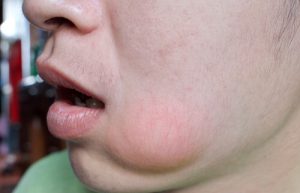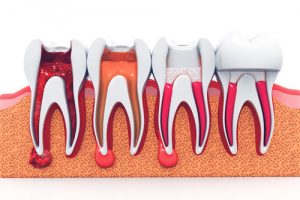Recognising the signs of gum disease can be the key to maintaining your overall oral health and safeguarding that radiant smile. Gum disease, also known as periodontal disease, is a stealthy adversary that can sneak up on anyone, causing discomfort, dental problems, and even threatening your overall health. This silent enemy often begins subtly, making it challenging to identify until it’s quite advanced. Therefore, knowing the signs of gum disease becomes your first line of defence, a crucial step in nipping this potentially serious health issue in the bud. From minor gum inflammation to major damage to the soft tissue and bone that support the teeth, let’s unveil the facts about this common but often overlooked condition.
What is gum disease and its relevance to dental health?
Gum disease, also known as periodontal disease, is an infection of the tissues that hold your teeth in place. It’s typically caused by poor brushing and flossing habits that allow plaque—a sticky film of bacteria—to build up on the teeth and harden. In advanced stages, gum disease can lead to sore, bleeding gums, painful chewing problems, and even tooth loss.
The relevance of gum disease to oral health is significant and multifaceted. Here’s why:
- Tooth Loss: The advanced stage of gum disease, known as periodontitis, can lead to the destruction of the bone and tissues that support your teeth, eventually leading to tooth loss.
- Connection to Overall Health: Emerging research suggests that the inflammation and bacteria associated with gum disease might play a role in some systemic diseases or conditions, including heart disease, diabetes, and respiratory diseases.
- Oral Pain and Discomfort: Gum disease often causes discomfort and can interfere with basic functions such as eating and speaking.
- Aesthetics and Confidence: As gum disease progresses, it can cause gums to recede, giving teeth an elongated appearance. Severe cases of the disease can lead to pus, bad breath, and changes in bite – all of which can impact one’s confidence.
Thus, identifying and treating gum disease in its early stages are essential steps in maintaining overall oral health and well-being. Regular dental check-ups, good oral hygiene practices, a balanced diet, and avoidance of risk factors like smoking can go a long way in preventing this disease.
Early Warning Signs of Gum Disease
Detecting gum disease in its earliest stages is vital in preventing its progression and safeguarding your oral health. Here are some early warning signs that should prompt you to seek professional advice:
- R
 ed or Swollen Gums: One of the first signs of gum disease is a change in your gums’ colour and texture. Healthy gums should be pink and firm. If they become red, swollen, or tender, it may indicate an early stage of gum disease, known as gingivitis.
ed or Swollen Gums: One of the first signs of gum disease is a change in your gums’ colour and texture. Healthy gums should be pink and firm. If they become red, swollen, or tender, it may indicate an early stage of gum disease, known as gingivitis. - Bleeding Gums: If your gums bleed easily during brushing or flossing, it’s a sign that they may be infected. While occasional slight bleeding isn’t necessarily a problem, consistent bleeding is a warning sign.
- Bad Breath or Bad Taste in Mouth: Persistent bad breath or a constant bad taste in your mouth can be indicative of gum disease or other oral health problems.
- Receding Gums: If your teeth look longer than they used to, it might be because your gums are receding—a possible sign of gum disease.
- Loose Teeth or Sensitivity: Teeth that feel loose or sensitive may be a symptom of advancing gum disease, suggesting the structures that hold them in place are being affected.
Remember, these symptoms might not always be painful or particularly uncomfortable, but that doesn’t mean they should be ignored. If you notice any of these signs, it’s best to schedule a visit with your dentist. With early detection, gum disease can be stopped in its tracks before it leads to more serious problems.
Advanced Symptoms: When Gum Disease Progresses
As gum disease progresses from gingivitis to periodontitis, symptoms become more severe and can significantly impact your oral health and quality of life. Here are some of the advanced symptoms of gum disease:
- Deep Pockets: Your dentist may find deeper than normal spaces between your teeth and gum line during an exam. These ‘pockets’ can harbour harmful bacteria, leading to more severe infection and damage.
- Changes in Bite: You may notice a shift in how your teeth align when you bite down. This change can occur because gum disease can affect the structures supporting your teeth.
- Persistent Bad Breath: While bad breath can be a symptom in the early stages of gum disease, it typically worsens as the condition progresses due to the accumulation of bacteria and decaying tissue.
- Tooth Sensitivity: As gums recede and pockets deepen, more of the tooth and root can become exposed, leading to increased sensitivity, especially to hot and cold.
- Loose or Shifting Teeth: As gum disease attacks the structures and gum tissue that surround support your teeth, it can lead to loose or shifting teeth and in severe cases, tooth loss.
- Abscesses: In severe cases of gum disease, pus may form in the pockets between your teeth and gums, leading to painful abscesses.
The advanced form of gum disease is a serious condition that can lead to further health complications beyond oral health. Therefore, if you suspect you may be experiencing advanced symptoms of gum disease, it’s crucial to seek professional dental help immediately. Treatment options are available, and the sooner you start, the better your chances of saving your teeth and improving your health.
Risk Factors and Prevention of Gum Disease
Understanding the risk factors associated with gum disease is essential for effective prevention. Some of these risk factors include:
 Poor Oral Hygiene: Lack of regular brushing and flossing allows plaque to build up on your teeth, increasing the risk of gum disease.
Poor Oral Hygiene: Lack of regular brushing and flossing allows plaque to build up on your teeth, increasing the risk of gum disease.- Smoking or Chewing Tobacco: Tobacco use is one of the most significant risk factors for gum disease. It also can lower the chances of successful treatment.
- Age: The risk of gum disease increases with age. The CDC states that over 70% of Americans 65 and older have periodontitis.
- Genetics: Some people are genetically predisposed to gum disease. If your family has a history of gum disease, regular check-ups are even more important.
- Certain Health Conditions: Conditions such as diabetes, rheumatoid arthritis, and HIV infection can increase the risk of gum disease.
- Medications: Certain medications can affect oral health, leading to dry mouth, which can increase the risk of gum disease.
- Hormonal Changes: Changes in hormones during life stages like pregnancy, puberty, menopause, and monthly menstruation make gums more sensitive, increasing the risk of gum disease.
While these risk factors can increase the likelihood of developing this condition, there are numerous ways to prevent gum disease:
- Maintain Good Oral Hygiene: Brush your teeth with a fluoride toothpaste at least twice a day, floss daily, and consider using an antimicrobial mouthwash.
- Eat a Balanced Diet: Nutrient-rich foods contribute to the overall health of your body, including your gums. Avoid excessive sugary foods and drinks as they can lead to tooth decay.
- Regular Dental Visits: Visit your dentist for regular check-ups and cleanings. Professionals can detect early gum disease symptoms like swollen or bleeding gums before they become serious.
- Quit Smoking: Tobacco is directly linked to gum disease. Giving it up can significantly reduce your risk of developing the condition.
- Manage Health Conditions: If you have health conditions that increase your risk of gum disease, managing them effectively can help maintain your oral health.
Preventing gum disease requires consistent and proactive steps, but the result—a healthy, vibrant smile—is certainly worth the effort.
When to See a Dentist: Taking Action Against Gum Disease
Recognizing when to see a dentist is crucial in effectively managing and treating gum disease. Many of the signs of this condition can be subtle, and some people may not experience any symptoms at all in the early stages. However, it’s important to schedule a dental visit if you notice any of the following:
- Bleeding Gums: If your gums bleed easily when you’re brushing or flossing, it could be a sign of gum disease.
- Swollen, Red, or Tender Gums: These are often early indicators of gum inflammation that could progress to periodontitis if left unchecked.
- Receding Gums: If your teeth look longer than before or you notice your gums pulling away from your teeth, creating a pocket, you should see a dentist.
 Persistent Bad Breath or Bad Taste: If you constantly have bad breath or a bad taste in your mouth, despite good oral hygiene practices, it’s time to see a dentist.
Persistent Bad Breath or Bad Taste: If you constantly have bad breath or a bad taste in your mouth, despite good oral hygiene practices, it’s time to see a dentist.- Loose or Shifting Teeth: This could indicate that gum disease has progressed and is affecting the supporting structures of the teeth.
- Changes in Bite or Fit of Dentures: Changes in how your teeth fit together when you bite or an adjustment in the fit of partial dentures could signify underlying gum disease.
If you experience any of these signs, it’s important to act promptly. By doing so, you can catch gum discomfort in its early stages, making it easier to treat gum disease and potentially saving your teeth.
Moreover, regular dental check-ups and cleanings are key to maintaining good oral health and catching signs of gum disease before they become serious. These regular visits, combined with a good oral hygiene routine at home and a healthy diet, can go a long way in preventing gum disease and protecting your smile.
Why Choose Us?
Seeking professional dental care is equally essential. Remember, even the most diligent oral hygiene routine is not a substitute for professional dental cleanings and examinations. Our team of dedicated and experienced dentists is here to provide comprehensive dental care tailored to your needs. Regular check-ups allow our professionals to detect any early signs of gum disease, cavities, and other oral health issues before they progress.
If you notice any changes or issues with your oral health, don’t wait for your next routine appointment. Seek professional help immediately. The sooner potential problems are identified, the more effective the treatment will be. We’re here to ensure your oral health is taken care of, so don’t hesitate to reach out and schedule an appointment with us.
Your oral health journey is ours too. Let’s walk this path together, ensuring your smile remains bright, healthy, and full of confidence.
References:
https://www.cdc.gov/oralhealth/conditions/periodontal-disease.html
https://www.mayoclinic.org/diseases-conditions/periodontitis/symptoms-causes/syc-20354473
https://my.clevelandclinic.org/health/diseases/21482-gum-periodontal-disease
https://www.nidcr.nih.gov/health-info/gum-disease
https://www.webmd.com/oral-health/gingivitis-periodontal-disease
https://www.nhs.uk/conditions/gum-disease/


Recent Comments